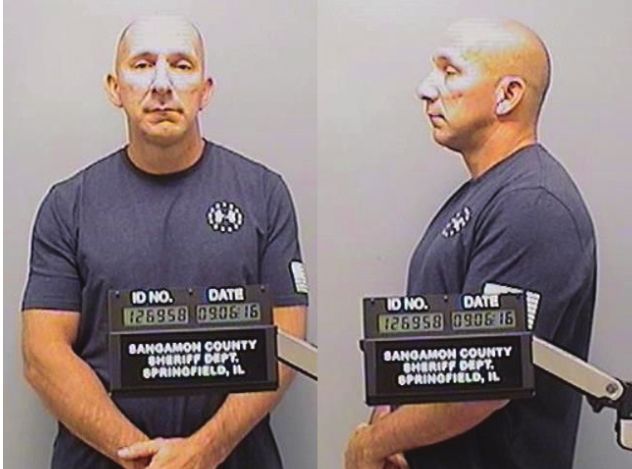
Department concludes cop lied to investigators
A Sangamon County sheriff’s deputy lied during an investigation into alleged steroid use but is due to return to duty on June 30, a month after serving a six-month suspension, according to internal affairs files.
John Bartello, a 10-year veteran of the force, acknowledged steroid use dating back to high school, according to internal affairs files obtained under the state Freedom of Information Act. He was known within the ranks as being a weightlifter who would post photos of himself online to show off his physique, an internal affairs investigator wrote.
The investigation began a year ago when the federal Drug Enforcement Administration told the sheriff’s office that Bartello had ordered 1,000 pills of methandrostenolone, one of the world’s most common steroids, from an online source based in Thailand. Methandrostenolone is illegal in the United States without a prescription. After state police served a search warrant at Bartello’s home, he admitted that another package of illegal steroids was en route. That shipment never arrived, according to internal affairs files.
Bartello in April pleaded guilty to a misdemeanor charge of possessing controlled substances. He was on paid leave for six months prior to the start of his suspension in January.
In addition to using steroids himself, Bartello was suspected of distributing them to others, but internal affairs was not able to substantiate the suspicion. Internal affairs also failed to substantiate the charge that Bartello had, in fact, been using illegal substances, even though police found used and unused syringes in his house and the deputy admitted during interviews with an internal affairs investigator that he had ordered and intended to take steroids. “No definitive evidence exists to prove he actually ingested any illegal substance or narcotic,” an investigator wrote in his findings.
There is no indication in disciplinary files that Bartello was tested for drugs after the federal Drug Enforcement Administration alerted the sheriff’s office to the shipment and state police served the search warrant. In addition to syringes, police who searched the deputy’s home found used and unopened bottles of peptides, a substance commonly used by bodybuilders to shed fat. The vials were labeled “Not For Human Consumption.”
“Bartello said the bottles were still mostly full because they did not taste good so he did not continue taking them,” an investigator wrote in a summary of an interview with the deputy.
Sheriff’s officials have refused to comment on the internal investigation, although they have acknowledged that random drug testing, which was instituted nearly a decade ago, ceased several years ago due to cost concerns.
Bartello claimed that he had ordered illegal steroids to address low testosterone levels that were being treated by a doctor. In addition to steroid pills, Bartello had also ordered an injectable steroid, even though he told investigators that he’d ordered pills because he didn’t like needles. Bartello, who had a prescription for testosterone injections, had told police that he’d purchased illegal steroids, which he claimed were the same as testosterone, to save money on co-pays that were required when he got testosterone injections from his physician. But internal affairs investigators who examined pharmacy records found that Bartello got 20-week supplies of his prescribed testosterone for $15 and had injected himself at home. In addition, the injectable steroid that Bartello ordered shuts down the body’s ability to produce testosterone, according to the internal affairs report, and that was noted on the website that advertised the substance as “the most powerful overall steroid in use by bodybuilders today.”
“Why would he order a substance that suppresses the body’s ability to create testosterone?” an investigator wrote. “This product seems to be for performance enhancing purposes as its very description says that it suppresses natural testosterone production.”
Bartello claimed that he ordered the injectable steroid in case the 1,000 steroid pills he had ordered didn’t work.
“The price for 1,000 pills, $130, and the sheer amount of 1,000 pills, seems like a strange risk to take for a product Bartello was not sure would be authentic or have the desired effect,” an investigator wrote.
Asked why he had purchased so many pills, Bartello answered that 1,000 pills was the smallest order possible, but the website from which the deputy had ordered the pills offered 200-pill bottles, internal affairs investigators found. The website that Bartello used had “certificates of approval” posted from such entities as JuicedMuscle.com and OutlawMuscle.com.
“When I asked Bartello why he did not use a commonly used, legitimate website like GNC, Bartello said GNC did not carry products that he needed,” an investigator wrote in his report. “That statement is simply not true. Simply typing the word ‘testosterone’ into GNC’s website located 118 items available, none of which required syringes or injection.” However, neither GNC nor two other mainstream websites that the investigator checked offered the illegal substances that Bartello had ordered from abroad.
While not upholding a charge of illegal drug use, the investigator determined that Bartello had violated a department provision that requires deputies to conduct themselves in such a way as to avoid bringing themselves or the department “into disrepute.”
“(I)t is my believe that Bartello made multiple false or misleading statements throughout the investigation,” the investigator wrote. “Bartello was untruthful when he stated he could only buy the pills in a quantity of 1,000. … The website Bartello used is enough to question his true motive for ordering these substances. I do not believe he ordered these pills and other substances for therapeutic or legitimate medical purposes.”
Contact Bruce Rushton at [email protected].